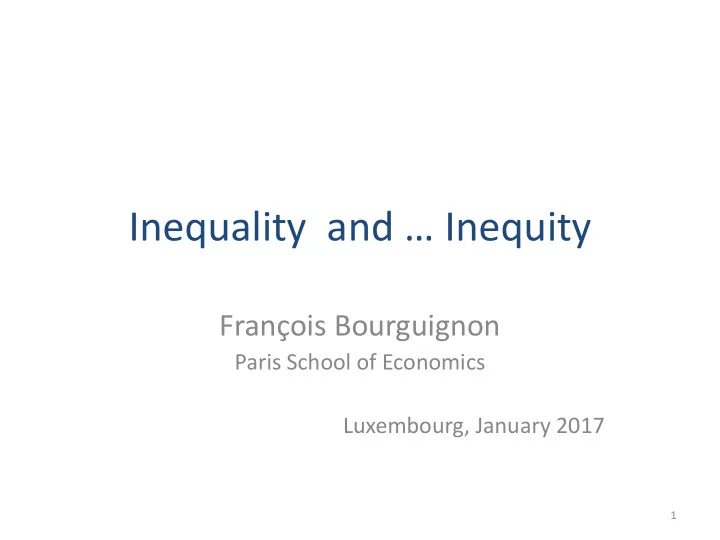

Inequality and … Inequity François Bourguignon Paris School of Economics Luxembourg, January 2017 1
Inequality at center stage Inequality issues at center stage • – The general increase in inequality – The US case – An explanation of recent surprise voting results (Brexit, Trump, …)? What issues ? • Perception of inequality (Brookings/Jean Jaurès 2010 survey) – – "Some are more unequal than others": deserving and undeserving rich (Leslie Mc Call) – Did Trump swing voters vote against income inequality? – A disappearing middle class? – The concern about future generation Inequality of WHAT? (Sen) • 2
Two views on inequality • Inequality of economic 'outcomes' (earnings, income, standard of living, welfare..): I Out • Inequity , or inequality of opportunity ("inégalité des chances"): 'assets' an individual is endowed with and that directly or indirectly generate economic outcomes ( I Opp ) • Two concepts strongly linked ( I Opp → I Out ) but not identical • The Marathon race illustration (with handicaps) • Which inequality concept should be used for policy making, within both a social justice and economic efficiciency perspective? 3
Outline 1. Definition issues 2. Measurement: observability issues − Intergenerational earnings mobility as an example 3. Policy issues: Equality vs. Efficiency − The inequality and growth conundrum 4. Why I opp and I out are the two faces of the same coin pointing to complementary policies 4
1. Definition issues: Equity (I opp ) vs. inequality ( I out ) Inequity/ I op p Unplanned random events (luck) Circumstances (7) Education, Assets, Social (5) Inequality/ I out background, Economic sphere Individual traits (gender, Outcomes race, migrant status..) Earnings Market mechanisms including Income market imperfections Living standard (4) (2) Policies, including redistribution, Health status market regulation, .. … Preferences (6) (3) Individual decisions ('efforts') (8) (1) Labor supply, entrepreneurship, smoking, 5
Libertarians vs. Egalitarians/Utilitarians Libertarians: Only that part of inequality that is not under individual • responsibility – i.e. circumstances - should matter Inequality in circumstances should be compensated • Egalitarians/Utilitarians: Only the inequality of outcome matters and should be • minimized … … while taking into account the need to preserve economic • incentives 6
2. Measurement: observability issues Are people 'responsible' for their preferences and 'efforts'? • 'Efforts' highly dependent on 'circumstances' – At the same time, many 'circumstances' are essentially • unobservable – e.g. family culture. → Not possible to go beyond determining how much I out is due to observed I opp Only a lower bound of actual I opp can be estimated – But extremely useful to know whether the share of I out • coming from observed I opp is going up or down … and how other components of I out behave! 7
Illustration: The Great Gatsby curve IGE = intergenerational elasticity of earnings (fathers/sons) = square root • of share of inequality explained by parents earnings Figure 3. The Great Gatsby curve 8
Time variations in inequality and IGE in the US Estimated Intergenerational Earnings Elasticity (IGE) and Income Inequality in the US: 1940-2000 Inequality: Share of Top 10% gross 0.6 0.3 income (right-hand scale) Intergenerationalelasticity : 40-44 years old 0.28 (left hand scale) 0.5 0.26 Income Inequality 0.4 IGE 0.24 Intergenerationalelasticity : 0.3 All ages 0.22 (left hand scale) 0.2 0.2 Source: from Aaronsson and Mazumder (2008) 0.1 0.18 1930 1940 1950 1960 1970 1980 1990 2000 2010 Year 9
Generalizing to all observed circumstances 10
3. Policy issues: Equality vs. Efficiency Preceding argument abstracts from economic (in)efficiency • issues Is it the case that a less inegalitarian or inequitable society is • performs better in aggregate economic terms ? Bu then, what does matter ? Equity or inequality? • 11
The growth-inequality conundrum Growth and inequality in a sample of growth spells 12 Source: Ostry, Berg and Tsangarides (2014)
Economic growth and inequality Would reducing outcome inequality accelerate growth? • Probably not. The inequality of opportunity through market imperfections • entails both slower growth and more income inequality The role of market imperfections • Capital markets – Inequality in access to quality education, decent job (discrimination), – justice Inequality in distribution of political power – Endogenous redisrinution slowing down growth – Overall, inequity may matter as much for efficiency than • inequality 13
4. But… the inequality of income matters too Demand side of the economy (the US crisis) • Income inequality creates inequality of opportunity for the next • generation (China example) Hence what is the optimal policy? • Policy of equalizing opportunities and redistribution through • taxes: − To generate revenues allowing for the equalizing of opportunities − To prevent the intergenerational transmission − But this has a cost in terms of growth 14
5. Conclusion • No duality and no choice to be made: Fighting inequality for social justice and economic efficiency requires attacking it on its two fronts, outcome and opportunity! • Many unkowns: 'optimal inequality', 'perception vs. reality', 'sensitivity', …but huge progress made in the understadning of inequality policy • Be prepared to face future inequality implications of technical change 15
THANK YOU 16
Recommend
More recommend